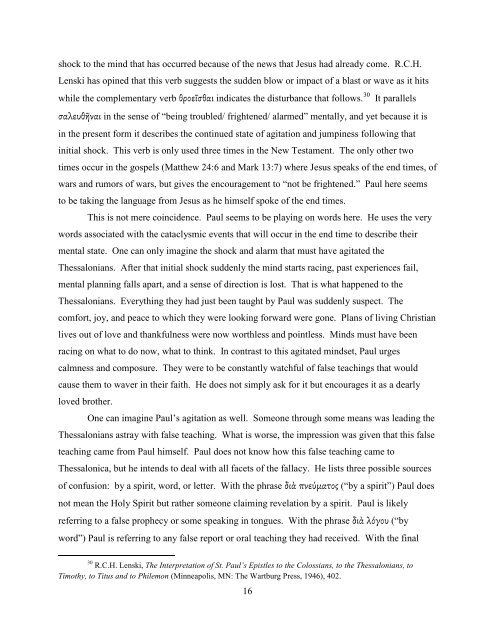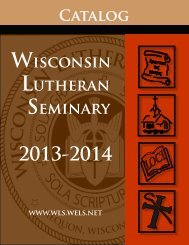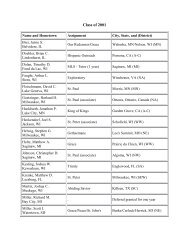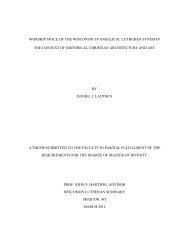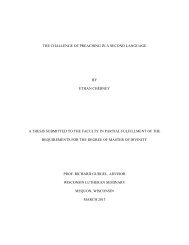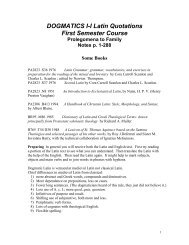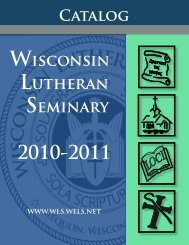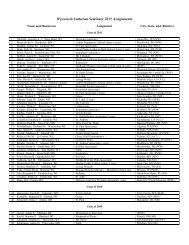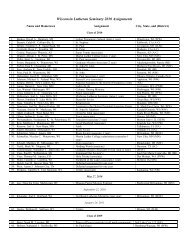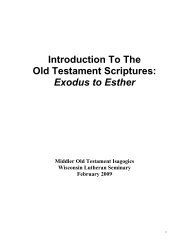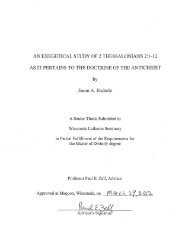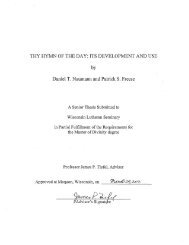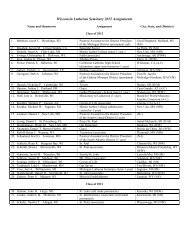Untitled - Wisconsin Lutheran Seminary - WELS
Untitled - Wisconsin Lutheran Seminary - WELS
Untitled - Wisconsin Lutheran Seminary - WELS
You also want an ePaper? Increase the reach of your titles
YUMPU automatically turns print PDFs into web optimized ePapers that Google loves.
shock to the mind that has occurred because of the news that Jesus had already come. R.C.H.<br />
Lenski has opined that this verb suggests the sudden blow or impact of a blast or wave as it hits<br />
while the complementary verb θροεῖσθαι indicates the disturbance that follows. 30 It parallels<br />
σαλευθῆναι in the sense of “being troubled/ frightened/ alarmed” mentally, and yet because it is<br />
in the present form it describes the continued state of agitation and jumpiness following that<br />
initial shock. This verb is only used three times in the New Testament. The only other two<br />
times occur in the gospels (Matthew 24:6 and Mark 13:7) where Jesus speaks of the end times, of<br />
wars and rumors of wars, but gives the encouragement to “not be frightened.” Paul here seems<br />
to be taking the language from Jesus as he himself spoke of the end times.<br />
This is not mere coincidence. Paul seems to be playing on words here. He uses the very<br />
words associated with the cataclysmic events that will occur in the end time to describe their<br />
mental state. One can only imagine the shock and alarm that must have agitated the<br />
Thessalonians. After that initial shock suddenly the mind starts racing, past experiences fail,<br />
mental planning falls apart, and a sense of direction is lost. That is what happened to the<br />
Thessalonians. Everything they had just been taught by Paul was suddenly suspect. The<br />
comfort, joy, and peace to which they were looking forward were gone. Plans of living Christian<br />
lives out of love and thankfulness were now worthless and pointless. Minds must have been<br />
racing on what to do now, what to think. In contrast to this agitated mindset, Paul urges<br />
calmness and composure. They were to be constantly watchful of false teachings that would<br />
cause them to waver in their faith. He does not simply ask for it but encourages it as a dearly<br />
loved brother.<br />
One can imagine Paul’s agitation as well. Someone through some means was leading the<br />
Thessalonians astray with false teaching. What is worse, the impression was given that this false<br />
teaching came from Paul himself. Paul does not know how this false teaching came to<br />
Thessalonica, but he intends to deal with all facets of the fallacy. He lists three possible sources<br />
of confusion: by a spirit, word, or letter. With the phrase διὰ πνεύματος (“by a spirit”) Paul does<br />
not mean the Holy Spirit but rather someone claiming revelation by a spirit. Paul is likely<br />
referring to a false prophecy or some speaking in tongues. With the phrase διὰ λόγου (“by<br />
word”) Paul is referring to any false report or oral teaching they had received. With the final<br />
30 R.C.H. Lenski, The Interpretation of St. Paul’s Epistles to the Colossians, to the Thessalonians, to<br />
Timothy, to Titus and to Philemon (Minneapolis, MN: The Wartburg Press, 1946), 402.<br />
16


